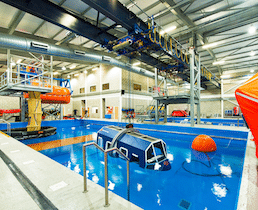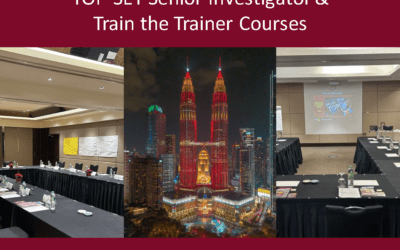As part of my role as a Kelvin TOP-SET Investigator, I attended the OPITO-approved Basic Safety Induction and Emergency Training (BOSIET), and the latest updated OPITO Standard for Minimum Industry Safety Training (MIST) in April 2016, at Survivex, in Aberdeen.
MIST is designed specifically for the UK Offshore industry, and is the minimum standard for safety training for all offshore workers on the UK Continental shelf, regardless of job role. The new MIST covers 5 key topics: Major Accident Hazards, Workplace Hazards and Personal Safety, Risk Management, Control of Work and Helicopter Safety.
MIST training was classroom-based, and undertaken over the first two days of the full five-day combined course. The course is module-based, and multiple-choice tests are mandatory on completion of each module, requiring an 80% pass. Fortunately, all six in the class achieved the pass mark, but it has to be said that the questions were fairly easy, with the instructor prompting the attendees during the modules, with the “important” parts on which we would be tested. Normally the class would have up to 16 attendees, but due to the stagnating oil price, causing industry lay-offs, take up on the courses has dropped considerably.
The Survivex building is a three-storey, state-of-the-art facility, with a reception area and canteen on the ground floor, classrooms and break-out area on the first floor and administration offices on the second floor. The Sea Survival, Helicopter Underwater Escape Training, and Lifeboat Training is carried out at the rear of the building, in a purpose-built unit.
BOSIET course started on day 3, with Offshore Safety Induction followed by CA-EBS, compressed air emergency breathing system training. The CA-EBS is replacing the EBS which is a re-breather, giving about a one-minute breathing window for escape, whilst the CA-EBS gives up to a two-minute window. However the latter has an uncomfortable mouthpiece, and a nose-clip which tends to fall off. In my opinion, it may be better to use the mouthpiece and nose-clip from the re-breather system.
Helicopter Escape Theory followed, with the Norwegian Escape Chute starting off day 2. The Helicopter Escape Practice was quite intensive, with a number of capsize exercises, involving 7 second breath-holding, with both open window, and window knock-out exits, plus EBS.
Sea Survival involved a fair amount of life-raft work. Getting into these things is no easier than it was in the late 1970’s when RGIT ran the courses at the old King Street Facility.
Fire and Self Rescue Practical involved fire extinguisher training and use, plus negotiating our way out of a smoke-filled room with smoke hoods. I was happy that the smoke these days is the dry ice nightclub type, not the real thing, as used in the past. First Aid Training and Heliport check-in procedures finished off the BOSIET course.
The 5 days passed quickly, but it was interesting to note that there are certain things that have been banned by the HSE in recent years. Instructors advised that they are no longer allowed to use the special effects during Sea Survival, such as waves, noise and wind.
I well remember the fire hose on the back of my neck in 1977 at RGIT, while trying to scramble into a life raft, accompanied by “encouraging” comments from the instructors – also no longer allowed. Righting a capsized life raft is no more, as one attendee had apparently suffered a cardiac arrest. Ultimately, it was decided that too many attendees had been stressed and traumatised by these experiences, so they had to be dropped from the course.
Understandably, safety is of primary concern in the offshore industry and has changed things immeasurably for the better, but I wonder if the BOSIET course has become a little too sanitised? I would be interested to hear what others think about this – contact me via LinkedIn or email
[email protected] if you would like to comment.
Before I forget, I would like to thank George, Ian and Neale, our Survivex instructors, and the canteen staff, who served up some good food, along with typical humorous Aberdeen banter.




